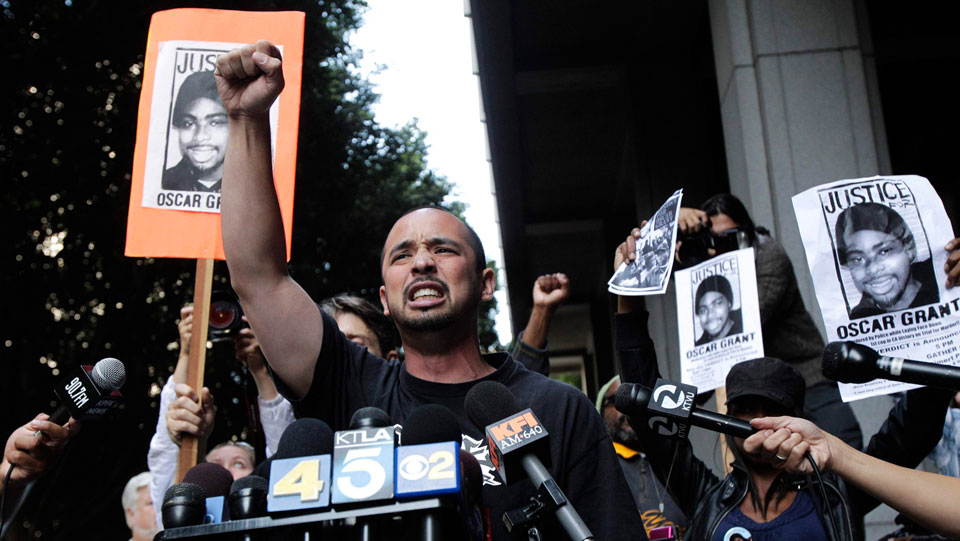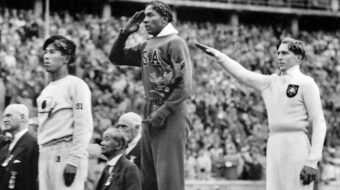
Ten years after the murder of Oscar Grant at the hands of Bay Area Rapid Transit (BART) police officers in Oakland, a newly unsealed internal report confirms his death was most likely not an accident and that one officer involved in the deadly shooting repeatedly lied about the facts of that tragic night. This internal BART report was not released through the benevolence of the agency, but rather due to requests made by journalists under the new California police transparency law, SB 1421.
In 2009, in the early morning of New Year’s Day, 22-year-old father Oscar Grant was shot in the back and killed by Officer Johannes Mehserle after being detained from a BART train at the Fruitvale station. The incident was captured on multiple official and private digital video and cell phone cameras. Grant’s death sparked justice-seeking protests throughout the state. Prosecutors charged Mehserle with second-degree murder. Mehserle pleaded not guilty. On July 8, 2010, Mehserle was found guilty of involuntary manslaughter, but not guilty of the murder charge and voluntary manslaughter.
The newly unsealed report, conducted by the Meyers Nave law firm that BART hired after the shooting, discredits much of the defense that Mehserle used during his trial.
Mehserle claimed that he intended to use his taser on Grant and not his gun. Based on enhanced video evidence, investigators said in the report that Mehserle attempted to draw his gun twice. It was on the third and final attempt he can be seen looking down at the gun holster to make sure the gun came out, the authors of the report noted. The report also makes note of six additional complaints of excessive force against the former officer in 2008. This is in addition to four complaints against Mehserle that were known at the time of his trial in 2010. The authors of the report stated this “was more than any other officer on the platform and more than most other BART PD officers in that year.”
The report highlights the role the second cop involved in the killing, Officer Anthony Pirone, played in adding to the hostile environment, along with his repeated lies to investigators after the murder. Pirone told investigators he felt as if he was “fighting for my life” with Grant, but the report concludes this claim was most likely a lie.
The report says video of the encounter at the BART station showed that Pirone struck Grant in the head and kneed him, likely causing injuries later documented in Grant’s autopsy. The report also adds that Grant did not fight back. During the investigation, Pirone lied about his excessive use of force on Grant, claiming that he and the young man had gotten into a scuffle. The report also notes how Pirone not only physically attacked Grant but called him a racial slur.
Former officer Mehserle served a mere eleven months (of a two-year prison term) for his role in Grant’s death, while Pirone was fired by BART but not brought up on any criminal charges.
Those who saw the camera footage of that tragic night might feel a sense of vindication now that this report is unsealed. This may be the start of an onslaught of truths and revelations the public will see more of, as the new state law, SB 1421, continues to be implemented.
The law requires law enforcement agencies to make public their internal reports concerning officers investigated for police shootings and use of force, those who were found to have committed sexual assault, and those who lied during the course of an investigation. This is a first in California history. Since the 1970s, when the Legislature began shielding police disciplinary records from public view, it has been one of the most secretive of states. The new law was proposed by State Sen. Nancy Skinner, D-Berkeley, and championed by many civil rights activists seeking a change in the structures governing how police misconduct is handled.
Now that the law is in effect, over thirty news organizations in California have come together under The California Reporting Project, which plans to continue submitting requests for records. This is because, although the records are now available under the law, there’s still a need for interested parties to not only request to obtain them, but to also help in shaping the narrative given to the public that needs to know. Since its inception, the news collaborative has made more than 1,100 public information requests under the new law. This is despite pushback from police unions seeking to keep records that existed before the law was implemented sealed.
This law and the enforcement of transparency that it brings is overdue, as continued complaints of police misconduct and police brutality across the nation, and specifically in California, make clear. A Sacramento Bee review of California Department of Justice data noted that police in the state shot and killed nearly 1,130 people during the last decade. In March of this year, two officers involved in the killing of an unarmed young Black man, Stephon Clark, were not brought up on criminal charges. Clark’s death has sparked protests and demands for police accountability, just as deaths all too familiar to his before have done. The new law in California may be a step in a more productive direction in seeking justice, although there is still a long way to go.
The full redacted Oscar Grant report can be read here.












Comments